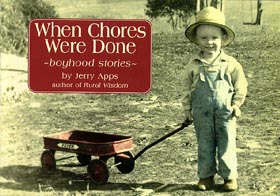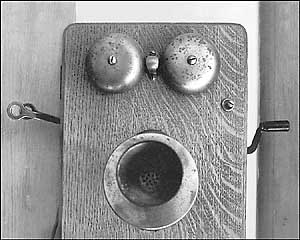|
|
 When
Chores Were Done (Amherst Press,
1999. Voyageur Press, 2006) When
Chores Were Done (Amherst Press,
1999. Voyageur Press, 2006)The Midwest in the 1930s, '40s and '50s was a place where parents
and children worked side by side to eke a living from the land, and
neighbors stuck by each other through good times and disaster. In this
affectionate, insightful memoir, Jerry Apps takes us to that world.
Here we meet Frank, Pinky, and Harry, three farmers whose love of
music could transform an entire community; Morty, the odd loner whom
only a few wild animals could understand; and Fanny, the extraordinary
collie whose role on the farm was as important as that of any human.
Apps shows us the toughness of farm life--plowing the soil with
horses, milking cows by hand, putting in long days with heavy,
dangerous machinery. He shows us the lighter side too, as he peddles
his father's massive rutabaga harvest and gets to know the neighbor
boys--and their personal dictionary of cusswords. Throughout it all,
we see just how warm, loving, and supremely educational, growing up on
a farm could be, for it is here that a young boy learns not only how
to take a head off a chicken and drive a tractor like a grown-up, but
to deal with illness, disability, and death.
Jerry Apps is a master storyteller who writes through the eyes of a
child and with the wisdom of a man. Resonating with poignancy and
humor, When Chores Were Done is a book you will want to read over and
over again. Photography by Steve Apps, staff photographer for
Wisconsin State Journal.
Photographs throughout
4-color laminated softcover
200 pages
10 x 7 inches
ISBN 0-942495-84-5
|
|
|
Book Sample:
Party Line
a story by Wisconsin author Jerry Apps
from his book "When Chores Were Done"
The wooden telephone, with a black
receiver hanging on its side and a black and silver mouthpiece
sticking out its front, hung on the east wall of the dining room, at a
height comfortable for Pa but too high for Ma, who had to stand on her
tiptoes to speak into it. Six of our neighbors were also on our line.
You knew when someone was calling by the number and length of the
rings. Our ring was a long ring and three short rings. The Milton’s
ring was three short rings. Coswells, who lived across from the
Miltons, could be reached with a long and two shorts.
 It didn’t matter whether
the call was for you or not; whenever the phone rang you ran for the
telephone to listen in. It was one way for farm people to find out
what was going on in the community. If Ma was in the house, which was
most of the time, she answered the telephone when it rang our ring or
listened in when someone else called. Occasionally we got a
long-distance call, usually from a relative. We could always tell when
it was long distance because Ma would whisper “long distance,” and she
would then begin yelling into the telephone mouthpiece. The farther
away the caller lived, the louder Ma figured she had to yell in order
to be heard.
It didn’t matter whether
the call was for you or not; whenever the phone rang you ran for the
telephone to listen in. It was one way for farm people to find out
what was going on in the community. If Ma was in the house, which was
most of the time, she answered the telephone when it rang our ring or
listened in when someone else called. Occasionally we got a
long-distance call, usually from a relative. We could always tell when
it was long distance because Ma would whisper “long distance,” and she
would then begin yelling into the telephone mouthpiece. The farther
away the caller lived, the louder Ma figured she had to yell in order
to be heard.
My brothers and I were not to use the
telephone, not to answer it, not to call from it, and, above all,
never to listen in on other people’s calls.
Mrs. Coswell was fun to listen in on,
which my brothers and I did when Ma was outside and we happened to be
in the house when the phone rang. Mrs. Coswell called Mrs. Handrich
when the Miltons did something she didn’t approve of. This occurred
every day, sometimes more than once a day, for there was little that
the Miltons did that Mrs. Coswell thought worthy of overlooking.
The Miltons, besides being masters of
profanity, had other quirks that added spice to the neighborhood. Tom
and Winny Milton didn’t get along all that well, and Mrs. Coswell was
often witness to loud yelling and threats that the Miltons made to
each other.
One day in December we heard
Handrich’s ring, and Ma trotted off to listen in. Soon she began
smiling and then laughing aloud. As she laughed, she tried to keep her
right hand planted firmly over the mouthpiece, so no one would know
she was listening. She might as well have kept her right hand in her
apron pocket, for everyone on the party line listened and everyone
knew that they did.
Later Ma told us—she had trouble
repeating the story she was laughing so hard—that Tom and Winny had
gotten into a terrible fight. In the middle of the altercation, Winny
picked up a huge piece of stove wood and heaved it straight at Tom’s
head. He ducked and the block of wood busted through their dining-room
window and landed in a snowbank outside their house.
“Now I don’t know how Mrs. Coswell
found all this out, but you know Mrs. Coswell, she is about as nosy as
they come, and if there is something to find out, she’d find it,” Ma
said.
Ma offered that one of the Milton kids probably told Mrs. Coswell,
complete with the words that each combatant spoke and at what point
the block of wood was taken up and heaved.
Ma, laughing so that now there were tears in her eyes, continued to
share the tale.
“Mrs. Coswell said that after the
block of wood sailed through the dining room window, the fighting came
to an abrupt halt. I suspect when that blast of cold air shot into the
dining room they both cooled off.” Ma sat down before she could
continue. “Before you could say ‘A block of wood just smashed through
the dining room window,’ old Tom was outside with a pillow off their
bed, stuffing it in the hole to keep out the cold.
“I wonder what’ll be next,” Ma said,
as she took a deep breath and wiped the tears away with her
handkerchief.
Another time, when we were eating
supper, the phone rang Handrich’s ring and Ma pushed back her chair
and hurried into the dining room to listen in.
Pa, my brothers, and I kept on eating,
listening to Ma giggle occasionally as she took in another tale of the
life of the Miltons and their continued antagonism of straightlaced
Mrs. Coswell, who spent most waking hours gazing across the road. This
time, Ma related when she returned to the table, the littlest Milton
boy had been running up and down the gravel road in front of the
Coswell house without a stitch of clothing on his back. He was wearing
his shoes though, because the road had been freshly graveled and there
were some sharp stones.
“Mrs. Coswell thinks that old lady
Milton put the kid up to the trick,” Ma said.
“I think she’s got it right,” Pa
offered as we continued eating supper, with our thoughts, for a moment
at least, away from low-priced milk, a sick cow, and rain that seemed
never to come.
<top>
|

